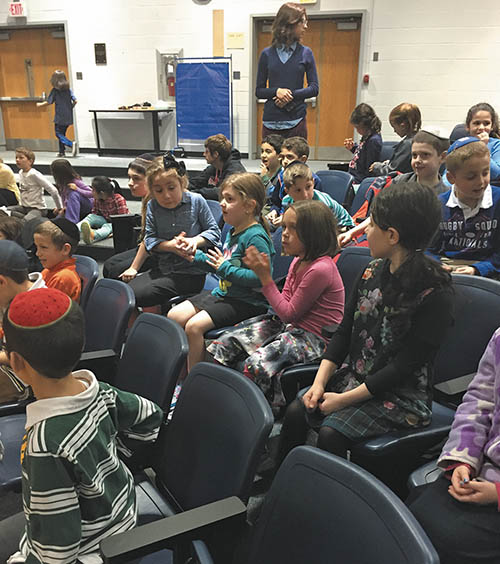
What are children learning in school these days? For some lucky students in Highland Park, the answer is more than everyday science. Bill Schultz, the Raritan Riverkeeper, spoke to 2nd-grade classes in the small borough, which borders the Raritan River, encouraging them to think about what happens when trash gets into the riverway and ends up downstream. The May 6 assembly combined about 150 students from six 2nd-grade classes at Bartle Elementary School and two at Rabbi Pesach Raymon Yeshiva (RPRY). The program was created to foster more of a community feeling between public and private schools in the Middlesex County school system, and it certainly succeeded. Councilman Josh Fine initiated the program, with the help of the Environmental Commission and dedicated teachers and administrators.
Agreeing that it would be a great way to tie the two schools together, the 2nd-grade classes reached out to Schultz, who was thrilled when the elementary schools contacted him last year. It brought a “whole new concept of public and private schools working together” to the programming, which he was then able to bring to his funders. Schultz reported that the program, now in its second year, is going well, with teachers sharing responsibility and running field trips.
Utilizing PowerPoint, Schultz explained that there are over 200 waterkeeper programs around the world trying to get the waters safe, swimmable and fishable. With some volunteer and some paid positions, the waterkeepers in the private, nonprofit agency use a variety of strategies to curb pollution.
To put it plainly, Schultz noted, they “talk for the fish and sue polluters.” Schultz deemed himself as “the Lorax for the fish, who don’t have a voice.”
Introducing the students to the concept of a watershed, he worked to impress upon them that when you litter in the northern part of the state, rainwater flushes it away, but it only flushes it away from you and on to someone else.
Teachers then engaged the students in an educational game, set to music, where they learned about how easy it is to pollute the nation’s waterways. The teachers followed with a guessing game, where students either stood or sat depending on whether they thought things such as plastic, Styrofoam, metal and paper would sink or float. They demonstrated the results by putting various elements into a fish tank filled with water.
Before a lively Q & A, Schultz noted that the river system had to be flushed out because liquid waste from factories was turning it into an industrial garbage can. The cleaning resulted in the waterways now being usable for recreational kayaking, as well as a safe home to fish and birds. The students were fascinated to hear that seals have even returned to the Raritan River and whales were spotted there last fall!
In conjunction with Earth Day, Schultz reiterated that we must “reduce, reuse and recycle” to get trash out of the streams. The riverkeeper left the students with the message that, “if each of you throws garbage in a can, that’s 150 pieces I don’t have to pick up.”
Emma Shannon, a student at Bartle, asked, “The gas the speed ships use, doesn’t that pollute?” To which Schultz replied, “Not as much as it used to, but it still does a little.”
“To keep rivers clean I learned not to throw trash in the water,” added Ahuva Broder of RPRY, while Tzvi Huff, also of RPRY, declared, “To keep the rivers safe we need clean water for many things, [like] to help fish be safe from pollution.”
Dahlia Wallace, a student at Bartle, learned that “if people pollute the river they will come and tell people to clean up the river and they will also clean up the river because the oil would kill the fish and they wouldn’t be able to breathe.”
Together, the students from area public and private schools are being educated about their environment, while learning about the importance of community.
ement at Cornell University.
By Sharon Mark Cohen








